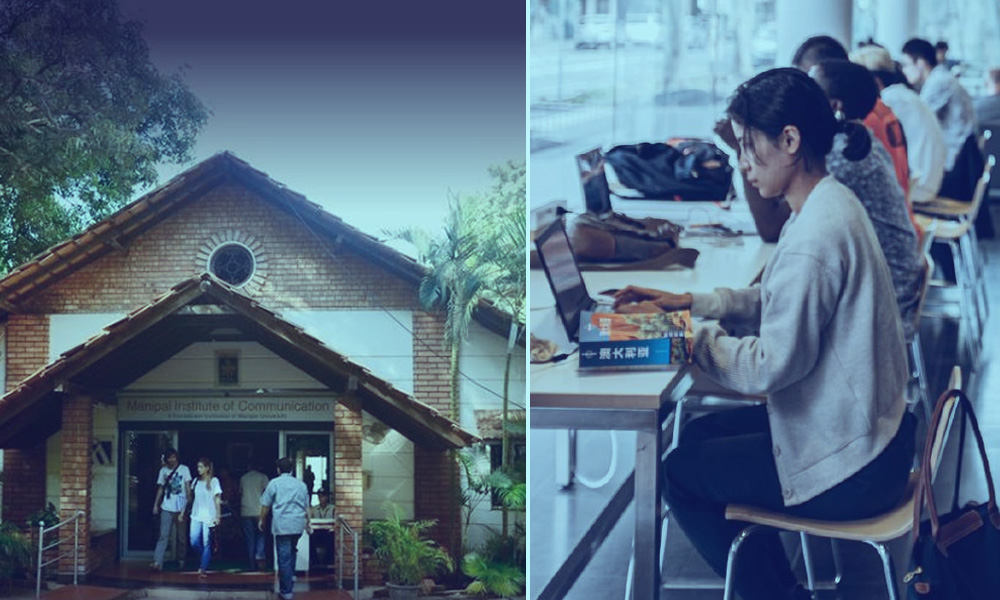
Image Credit: shiksha
'No Library, No Practicals, Full Fee': Manipal Institute Of Communication Students Revolt Against Management
Karnataka, 23 July 2020 11:55 AM GMT | Updated 23 July 2020 12:08 PM GMT
Editor : Shubhendu Deshmukh |
Shubhendu, the quint essential news junky, the man who loves science and politics in equal measure and offers the complete contrast to it by being a fan of urdu poetry as well.
Creatives : Abhishek M
" An engineer by profession, Abhishek is the creative producer of the team, graphic designing is his passion and travelling his get away. In more ways than one, he makes the content visually appealing."
Students claim that the online classes are of hardly any use to them as they are mostly dependent on the practical labs and library, to which they have no access from their home.
The coronavirus pandemic has brought the lives of millions to a standstill. While we have all focused on the plight of migrant workers and other underprivileged communities, one group of people's struggles have not been highlighted as much as it was needed -- students of our country.
Students of Manipal Institute Of Communication (MIC) in Karnataka, under Manipal Academy Of Higher Education (MAHE), have accused the university of forcing them to pay the entire yearly fees while classes are only taking place online in the absence of the basic facilities.
The Logical Indian spoke to students of MIC to understand their circumstances.
The college was shut down in mid-March, and online classes began only in June.
"Just last week, our college put out a circular asking us to pay the entire fees within two weeks," says Amisha (name changed), a Masters student.
"Our fee happens to be Rs 2,50,000 per year. As soon as the circular came out, several parents wrote to all the concerned authorities, including the fee department and the director," she says.
One of the many emails sent to the authorities.
"It's not that the authorities are not active on social media. We can see our director posting on Twitter and Instagram. However, when it comes to the students' vulnerable situation, they choose to remain indifferent," Amisha says.
Recently, the students received an email from the director, saying that a meeting would be held on August 10 about how the semester would roll out.
"This could be the vaguest response to all our woes. The email did not talk about the issue with the fee. Our deadline for fee submission is July 30, and the meeting will be held on August 10. It's preposterous," she says.
A recent email also addressed how the semester will roll out, but the issue with the fee was not discussed.
The students conducted a survey involving over 100 students to bring the ground realities to light. The survey sought answers to questions like whether students have a problem with paying the entire yearly fee and if they think a fee break-up is required. Most questions saw answers that revealed unity among the students, as most agreed on the same.
The results of the survey were sent to the authorities but have not acted so far.
Sunita (name changed), about to be promoted to the second year, says that a major problem is that they cannot reach out to the authorities.
"Being away from the campus amid the crisis, we cannot even talk to the authorities face to face. Our emails, scores of them, have remained unanswered," she says.
Several businesses have run into losses amid the pandemic. There are people living off only their savings. Such is the situation of Astha's family.
Aastha (name changed), says: "My father has zero income right now. How can he pay such a massive amount within such a short period of time? Most importantly, why should we pay the entire fee, given we do not have access to more than half the facilities that the college should give us? For media students, who are largely dependent on practical skills, online classes are hardly of any use."
Some students of MIC claimed that the online classes were absolutely disadvantageous.
"Teachers come online, hardly teach anything, and leave. We are dependent on our classes, theory and practical. We depend on the notes. Online classes have only helped the teachers to evade their responsibilities. And yet, despite all these issues including unavailability of most facilities, they want the entire fee," says Shruti (name changed), a postgraduate student of MIC.
"It's not just about me. My parents may be able to afford to pay the fee within 14 days, but there are people I know who can't. There are people going to cyber cafes to work due to intermittent or unavailable internet connection. Businesses are hit, people have lost their jobs. It's not just about the amount being unaffordable right now, but about drawing a line before the injustice reaches its peak. No facilities, yet the entire fee. This is intolerable," she adds.
Not just MIC, a number of colleges and universities are facing the same issue during a time that is already tough to get through. Educational institutions are supposed to encourage and empower students to study, especially during times such as these. On humanitarian and logical grounds, they should motivate students to move ahead.
Being ignorant of their circumstances and indifferent towards their troubles only add to the already heavy burden they are carrying.
Educational institutions should serve as a safe haven for students, rather than becoming a barrier to their journey towards success.
Also Read: 50-year old Grandmother Clears Class 12 Board Exam In First Attempt In Meghalaya
 All section
All section














